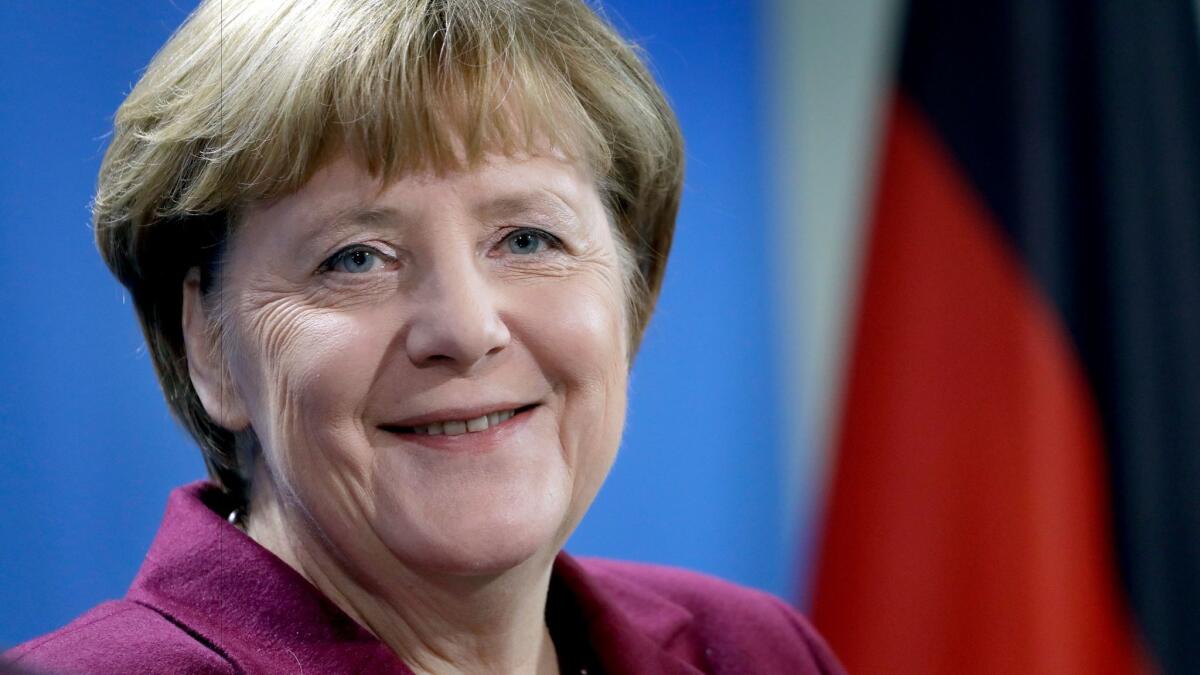German Chancellor Angela Merkel says she will seek a 4th term next year

German Chancellor Angela Merkel at a Nov. 8 news conference in Berlin.
- Share via
German Chancellor Angela Merkel announced Sunday that she would seek reelection next year, a step that could provide a powerful counterpoint to the anti-globalization, anti-immigration narrative put forth by U.S. President-elect Donald Trump.
Merkel, facing a backlash against asylum seekers, ended months of speculation about whether she would again take up her party’s standard as a populist tide rises across Europe. Polls have shown she still enjoys strong support, if less so than before Germany, a country of about 80 million people, opened its doors to nearly 1 million new arrivals last year.
“I want to serve Germany,” Merkel, 62, told reporters in Berlin after meeting Sunday with members of her party, the Christian Democratic Union. She acknowledged, though, that “this election will be difficult like no other election since reunification” — the joining of the communist East with West Germany in 1990 after the fall of the Berlin Wall.
Germany’s economic dominance has made Merkel the most important leader in Europe, and she won plaudits for her calm handling of an array of crises, from the threat to Europe’s common currency to Russian aggression in Ukraine. Elections are set to take place in the fall of 2017.
At her news conference, Merkel rejected the notion that with President Obama nearing the end of his second term, she assumes the primary role as a defender of liberal democracy in the West, saying it was “absurd” to think such a role could fall to any one person. But she has aligned herself firmly with the legacy of Obama, who last week made his last visit to Germany as president.
Together, the two leaders penned an op-ed noting that “our countries share a joint responsibility” to defend institutions such as the North Atlantic Treaty Organization and international agreements such as the Paris climate accord.
Standing beside Obama at a news conference Thursday, Merkel stressed the need to defend the values of “democracy, freedom and human rights” — echoing language she had used in a congratulatory but distinctly admonitory message to Trump after his election win.
Merkel acknowledged that the increasing integration of the world economy had left some behind, and that inequalities needed to be addressed. Globalization, she said, “needs to be given a human face.”
During his campaign, Trump had criticized Merkel, predicting she would be forced from office.
Merkel’s popularity ratings, rock-solid for most of a tenure that began in 2005, fell substantially after the record-breaking wave of immigration in 2015. Her party suffered a string of setbacks in subsequent state elections. Anxiety over asylum seekers bolstered a right-wing party, the Alternative for Germany.
The chancellor came under strong pressure from the Christian Democrats’ sister party in the southern state of Bavaria — the main landing point for migrants making their way to Germany via its Balkan neighbors — to set strictly enforced limits on new arrivals.
Merkel for months strongly defended her decision to open the borders to hundreds of thousands of arrivals, mainly from war-torn countries such as Syria, Iraq and Afghanistan. In September, though, she acknowledged that she wished she could have turned back the clock to better prepare her country for such an influx, comments widely read as a mea culpa.
“For some time, we didn’t have enough control” of Germany’s frontier, she said then.
Despite the immigrant issue backlash, polls suggest that a majority of Germans — 55% — hope Merkel will serve another term. A poll published Sunday by the Emnid research institute suggested if the elections were held now, her party would win easily, though by smaller margins than previously.
Merkel, a Protestant pastor’s daughter and Germany’s first leader to have come of age in the communist East, is widely regarded as moderate and sober-minded, traits that are attractive to a traditionally risk-averse German electorate.
“Angela Merkel stands for stability, reliability and thoughtfulness,” a senior party colleague, Julia Kloeckner, told the Rheinische Post newspaper.
If Merkel wins the election and serves out a full term, it would match the record set by former Chancellor Helmut Kohl, who was at the helm when the Berlin Wall fell in 1989. Unlike the United States, Germany has no term limits.
ALSO
Thousands rally in Malaysia to demand the scandal-ridden prime minister resign
Nearly 100 killed as train derails in India; crews work to free trapped passengers
Obama confronts an uncertain future on trade with the likely death of his signature TPP deal
UPDATES:
3:15 p.m. This article has been updated throughout with Times reporting.
7:35 a.m.: This article was updated with details throughout.
This story was originally published at 5 a.m.
More to Read
Sign up for Essential California
The most important California stories and recommendations in your inbox every morning.
You may occasionally receive promotional content from the Los Angeles Times.










